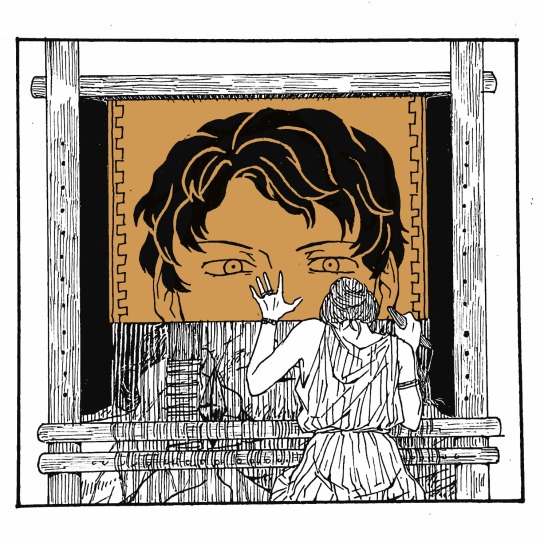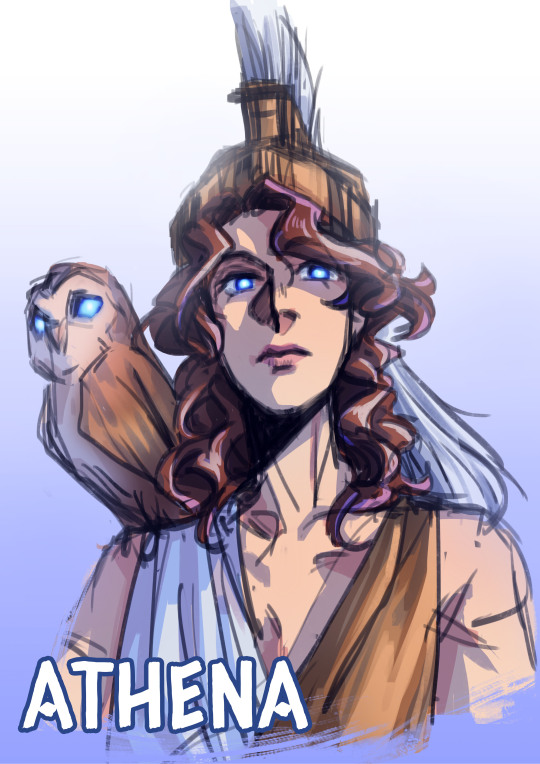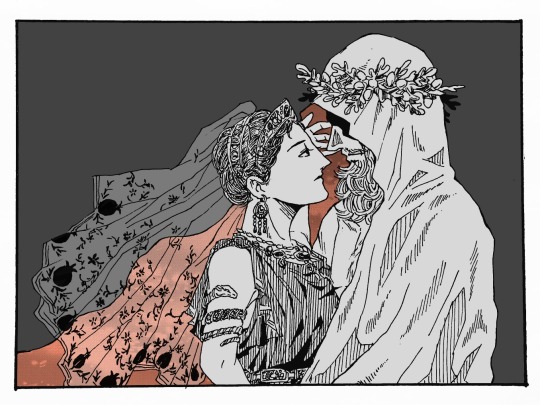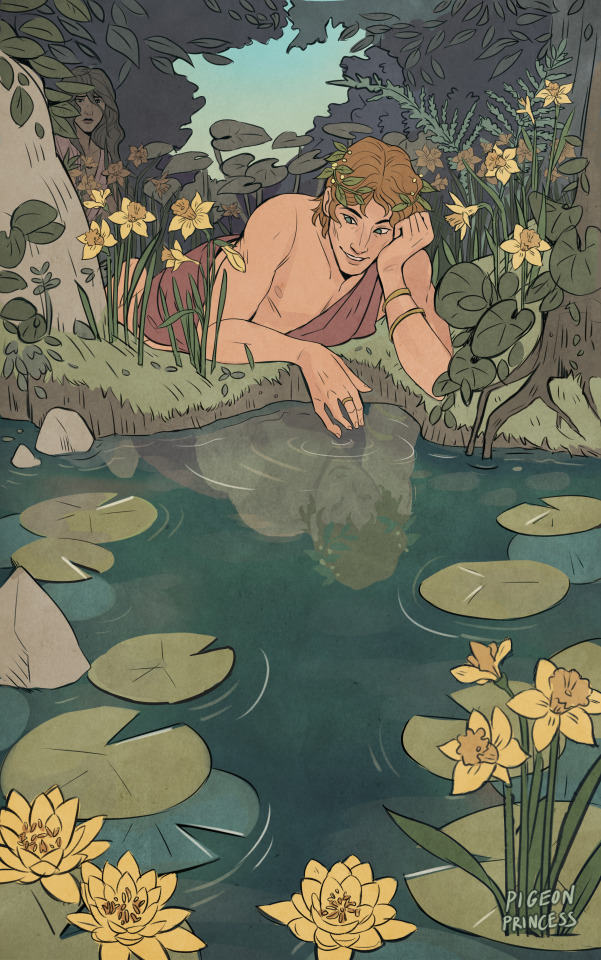#ancient Greek myth
Text
What returned and what did not return.

#Odysseus#Penelope#homer#the odyssey#ancient greece#greek mythology#ancient greek mythology#greek myth art#greek myth#ancient greek myth
2K notes
·
View notes
Text
Welcome to ClassicsTober 2023!
✏️🏺🖊️
In 2021 my friend Dr Cora Beth Fraser and I (@greekmythcomix ) accidentally started ‘Classics-tober’ – a list of Ancient Mediterranean Myth and History prompts for each day in October, so that we had an excuse to draw Classics stuff for a month. We did it again last year and even more people joined in, so we’ll be running it again this year – we’re just putting the final touches to the prompt list for this year. And now that there are a LOT of new Social Media platforms, we’re going to be attempting to run it on as many of them as possible!
The idea is to create something - anything - for the prompt. Like other October prompt lists, it can be an illustration, but it can also be text, reference, historical artefact, video, story, translation... pretty much anything you're interested in from the Ancient Med World that fits with the prompt. There's no pressure to do every single one, just the ones you like.
This year we’ve chosen Ancient Greek Myth Characters, some well-known and others less so.
If you'd like to join in, tag this account and use #ClassicsTober and #ClassicsTober23 on your social media posts when you share them (and if on Tumblr tag this account)
NOTE: please make sure if you share the graphic you add the ALT text (below for you to copy and paste)

ALT:
Classics*-Tober3
Ancient Greek Myth Characters
* meaning Ancient Greece and Rome because no one's come up with a better term yet, but if you want to add additional Ancient Med cultures then yes please - especially if you can link them to versions of these myths/ characters!
1 Cassandra
2 Medusa
3 Asterion
4 Lycaon
5 Chiron
6 Medea
7 Persephone
8 Icarus
9 Achilles
10 Asklepius
11 Pandora
12 Theseus
13 Arachne
14 Helen
15 Prometheus
16 Circe
17 Atalanta
18 Phaedra
19 Sisyphus
20 Odysseus
21 Psyche
22 Midas
23 Orpheus
24 Hephaestus
25 Talos
26 Thetis
27 Pygmalion
28 Nyx
29 Nemesis
30 Tiresias
31 Hecate
#ClassicsTober #ClassicsTober23
Share or create any style of media inspired by the prompt for the day - illustration story, poetry, artefacts, video, translation, anything! Do as many as you like. Share with the hashtags above.
#classicstober#ClassicsTober23#ancient history#ancient Greek myth#greek myth#prompts list#writing#writing prompts#drawing prompts#greek mythology#ancient greek mythology#classical civilisation
178 notes
·
View notes
Text
apollo using the leaves of the laurel tree, of daphne’s tree, daphne who had ran so, so far to get away from him, who had begged her father to do anything to save her, who had even still shrunk away from his embrace after she had turned into the tree, is something so evil + rotten to me.
after her clear “no”, emphasised over and over again, after her desperation to escape him, he then uses her leaves and bark to “honour her” in a way that ensures she can never be free of him, must always be touching him, brought with him wherever he goes, part of his “glory” + “victory”.
even after a kind of “death”, even after trying so hard to outrun him that she gives up her life + dreams + family, by doing the only thing she now can, he doesn’t let her go. and now, not only does he have her, but she can’t refuse:
she can’t say “no”, and she can’t pull away.
she can’t even speak.
#this story has always made me so so sick to my stomach i hate it i hate it so much#tagamemnon#apollo#apollo x daphne#greek mythology#daphne daughter of peneus#apollo and daphne#ancient greek myth#ancient greece#mythology#i
127 notes
·
View notes
Text
I just found out that apparently there's an interpretation where Zeus straight up kidnaps Artemis and Apollo from Delos to fight Python. It's not a popular one, but it exists and all I can think of is this:
Apollo: I do care about Zeus although he kidnapped me and Artemis.
Dionysus *chokes on wine*: EXCUSE ME??
Apollo: Not the worst thing he's done.
#it's so funny#wdym you kidnapped your own kids#zeus what are we doing#apollo#artemis#mythology#ancient greek mythos#ancient greek myth#greek myths#greek mythology
38 notes
·
View notes
Text
me, with a degree in ancient mediterranean studies, who has specifically studied ancient greek language, literature, drama, and epics, knows more ancient greek myths than Rick Riordan (because I’ve read all his works too), reading The Song Of Achilles: ok but maybe they’ll both live this time
#tsoa#the song of achilles#classics#ancient greek myth#myth#iliad#original post#i am crying ms madeline miller#how did you manage to fucking surprise me with this one#i thought i already knew all the story beats but then she just kept going#ow
132 notes
·
View notes
Text
Since folks liked my response to the writing prompt dealing with ancient Greek mythology, I’ve decided to indulge an idea of mine: a rewrite of the myth of Aphrodite and Hephaestus’ marriage, as well as its outcome. Enjoy!
———————————
Shattering Ivory Keys, Pt. One
Hephaestus lies awake at night, thinking about the throne holding his mother captive. He thinks about the demand he made of the other gods before leaving: “Unless I receive the hand of Lady Aphrodite in marriage, Lady Hera stays in this chair.”
It was a rash thing to say. The whole plan was rash, if he is honest with himself. He isn’t sure if he wants to be honest with himself. Being honest means admitting the other gods would never fulfill his request. Being honest means admitting he made an impossible request on purpose — that he looked at the bruises blooming on his mother’s arms and thought, Good.
Hephaestus opens his bedroom door in the morning with bags under his eyes. He leans on his cane, his leg braces creaking beneath him as he shuffles into the hall. It takes a moment for his bleary mind to register someone else is there.
Hermes hovers a foot off the ground in his fluttering sandals. “We accept your offer,” he says.
Hephaestus stumbles into a chariot several minutes later, his pulse a drumbeat in his skull. Hermes has to pull the reins because Hephaestus doesn’t think this is real, doesn’t understand how this happened, doesn’t know how to keep the bile from creeping up his throat—
And then he is there. He is standing in Olympus again, his hammer in his right hand and his cane in his left hand. His swing is steady and sure. The chains around his mother shatter, splintering on the floor in fine metal shards. The chains around Aphrodite latch with a sharp click.
He knows Aphrodite hears the click too. She has to hear it. She has to see Zeus smiling over the proceedings, his teeth jagged keys out of reach in his velvet gums.
The wedding is the very next day. Hephaestus watches Aphrodite walk down the aisle, her long curls of black hair brushing against the marble floors. She is a plump goddess, the soft curve of her stomach draped by a silvery dress that shimmers against her copper skin. Brown eyes flecked with gold peer through her sheer veil.
They never dart his way. He can’t find it in himself to meet them.
Zeus stands at the altar, joining Hera as she proclaims the marriage rites. He claps his hands when it’s all over. Ozone crackles in the air, searing the burnt smell of magic into Hephaestus’ nostrils. “This marriage is now recognized by myself, binding until the end of time.”
Hephaestus sprawls on a cot in his forge that night, sweating despite the unlit furnaces. He hopes Aphrodite is comfortable in his bed, unafraid of him insisting on certain rites.
There are many more silent days. Hephaestus sees only glimpses of black hair around corners, smelling the faint aroma of roses. He keeps his eyes low. He hesitates, hovering his hand over doorknobs before pulling it away. A bundle of thistles prickle in his chest.
Hephaestus sees Aphrodite’s attendants cluster around her wherever she goes. One of them lingers, planting her hands on her hips. She is a lean, muscular woman with warm brown skin. “You should be ashamed of yourself,” she says. Her braids of black hair sway as she turns on her heel and strides off, Hephaestus’ words dead and lumped together in his throat.
A week after the wedding, he sighs. He snatches a stylus from a cup on his workbench, hunching over a clay tablet. He carves script into its yielding surface.
The door to his forge flies open. Hephaestus whips his head around as Aphrodite says, “We need to talk.” She stands in the doorway, her hands balled into fists.
Hephaestus swallows hard. “I know,” he says. “I’m sorry.”
She opens, then closes her mouth. She blinks at him.
He tosses the clay tablet onto his workbench. “It was wrong. All of it. I — I never thought they’d actually accept. I didn’t want them to accept.”
“Oh,” she says after a pause. “You wanted Hera…”
“Yes.” Hephaestus’ grip tightens around his cane. “But I should’ve thought about it. Should’ve realized there’d be a chance they’d say yes. Should’ve thought about you.” He glances away, shifting his weight. “So I’m sorry.”
The silence that follows is heavy. Then, Aphrodite unclenches her hands. “I believe you. I don’t forgive you, but I believe you didn’t mean to hurt me.”
“I didn’t. I want to fix this, Lady Aphrodite.” Hephaestus runs his thumb over the iron handle of his cane. “It’s not like my creations, though. Those aren’t given Lord Zeus’ binding seal.”
“They aren’t.”
“So I’ll ask you this instead: what do you need? What can I do — or what shouldn’t I do —for you?”
“You mean, what’s my boundaries?”
He flushes. “Sorry. Could’ve phrased that better.”
“It’s fine.”
Hephaestus knows it’s not fine. It can’t be fine. But he sees her shoulders relax from their tense line, her brow smoothing out. So he can hope for a future where somehow, someday, it will be fine.
“Alright,” Aphrodite says. “I don’t want to be touched anywhere. I want to keep sleeping in separate rooms. I want…” She folds her arms. After a beat, she says, “I want to keep seeing people. To keep seeing Ares.”
Hephaestus’ eyebrows shoot up. “Ares?”
“I love him,” she says, lifting her chin. She pulls her shoulders back, uncrossing her legs to widen her stance. “I—”
“No, no. You don’t have to justify yourself,” Hephaestus blurts, waving his hand. “Keep seeing him. Do what you want. It’s not my place to stop you.”
“…you’re sure? You’re my husband.”
“I don’t think either of us wants our relationship to be like that. And I don’t want to control you. I’ve messed with your life more than enough already.”
Aphrodite looks at him, then sighs, slumping a little. “Alright. Alright. That’s good.” She frowns. “You sounded surprised.”
Hephaestus coughs, rubbing his arm. “Ah, well. I guess. I just didn’t think of Ares as — um—”
To his surprise, Aphrodite laughs. It’s light and tinkling, the chiming of tiny bells stirred by the breeze. “I get that a lot.”
“I don’t mean any offense. I’m sorry.”
“None taken. He didn’t think he was that type either. But we both wanted to give it a try.” A faint smile spreads across her face, her gaze going distant. “It was worth it.”
Before Hephaestus can say anything else, a head pokes through the doorway. It’s the attendant who told him off earlier. She glances between them, her brow furrowing. “Is everything alright, Lady Aphrodite?”
Aphrodite shakes herself back to the present. She brushes her hair over her shoulder, still smiling. “Yes, Aglaia. Lord Hephaestus has apologized and promised not to interfere any further in my life.”
“I swear it on the River Styx,” Hephaestus says.
Aphrodite and Aglaia both whirl around, startled. Hephaestus himself feels startled. But he said those words out loud. He said them and he doesn’t want to take them back. So he rolls his shoulders, thumping his cane on the floor. “I swear on the River Styx to let Lady Aphrodite live her own life. I swear to do everything in my power to do right by her — to help fix this whole mess until both of us are happy again.”
A long, tense silence ensues. Aphrodite stares at him. Aglaia steps into the forge, her hands fisted in the skirt of her dress.
“I had to say it,” Hephaestus says, his voice soft. “I have to make it right.”
Aphrodite walks towards him. “You’ve already started it.” She holds out a hand, turning her full, rounded face up towards his. “And we can do it together.”
Hephaestus looks at her outstretched hand. He looks at her. At her nod, he takes her hand in his. “Alright. Together, then.”
#my writing#ancient greek mythology#ancient greek gods#ancient greek myth#the marriage of hephaestus and aphrodite#shattering ivory keys#shattering ivory keys: part one#(yes this is a multipart story!)#aphrodite#aphrodite greek mythology#hephaestus#hephaestus greek mythology#aglaia#aglaia greek mythology#greek mythology#greek myth#greek gods#greek gods and goddesses#creative writing#my creative writing#fiction#my fiction
47 notes
·
View notes
Text
I hate to be the bearer of bad news, but that was not Artemis you slept with... 🐻🌙

#greek mythology#meme#greek mythology meme#greek myth meme#greek myth#tagamemnon meme#tagamemnon#classics#classics meme#Callisto Greek mythology#Zeus meme#ancient Greek#ancient Greek myth#greek mythos#greek Mythos meme#myth meme#mythology meme#Olympians#Greek gods#greek gods meme#Hellenic myths#Hellenic memes#Ancient Greece memes#classical#classical memes#greek myth memes#greek mythology memes#greek myths#Hellenic mythology memes#greek mythos meme
11 notes
·
View notes
Text
Why Clytemenstra Would Eat HotD Alicent for Breakfast
Clytemnestra, in Greek legend, a daughter of Leda and Tyndareus and wife of Agamemnon, commander of the Greek forces in the Trojan War. She took Aegisthus as her lover while Agamemnon was away at war. Upon his return, Clytemnestra and Aegisthus murdered Agamemnon. Clytemnestra was then killed by her son, Orestes, with the help of his sister Electra, in revenge for his father’s murder.
In Aeschylus’s play Agamemnon, part of his Oresteia trilogy, Clytemnestra is driven to murder Agamemnon partly to avenge the death of her daughter Iphigeneia, whom Agamemnon had sacrificed for the sake of success in the war, partly because of her adulterous love for Aegisthus and partly as an agent for the curse on Agamemnon’s family, the House of Atreus.
Britannica
Alicent never goes outside of the bounds of female passivity and sexual obedience that a feudal patriarchy enforces and compels from its girls and women. She also fails to protect her daughter from her rapist son. and can’t make nay strong moves against her supposed enemies without feeling like she’s being supported by her father, who himself is more there for himself than for her.
Meanwhile, Clytemenstra has a continuing relationship with another man and decisively, willingly and purposely brings kills her husband to revenge her daughter’s death.
She decides for herself that her husband doesn’t deserve her loyalty for killing his own daughter, while Alicent dutifully continues to serve Viserys and make him comfortable because she feels she has to.
And she looks for an extramarital relationship, again, because she follows through with her disgust with her husband.
Unlike Alicent.
#alicent and mythology#alicent clytemenstra#alicent hightower#clytemenstra#ancient greek mythology#ancient greek myth#greek myth#greek mythology#hotd critical#hotd commentary#hotd comments#hotd comment#hotd characters#hotd characterization#asoiaf#a song of ice and fire
2 notes
·
View notes
Text
Odysseus' last words to Poseidon

#greek mythology#ancient greek mythology#greek mythology memes#odysseus#poseidon#greek myth#greek gods#the odyssey
15K notes
·
View notes
Text

Goddess of wisdom
#art#my art#digital art#digital drawing#artwork#fan art#greek mythology#digital#greek goddess#goddess#goddess of wisdom#athena#greek myths#greek myth#ancient greek mythology#ancient greece#epic the musical fanart#epic: the musical#epic the musical#tagamemnon
1K notes
·
View notes
Text

#zeus x hera#hera#zeus#juno#jupiter#ancient greek god#ancient greek myth#ancient greek mythology#greek myth#greek mythology#greek myth art
966 notes
·
View notes
Text
It’s the last day of #ClassicsTober23 , and I ( @greekmythcomix ) just want to say a massive thank you on behalf of me and Dr Fraser to everyone who has taken part over here on Tumblr, in our third year of running the prompts!
Such. Utterly. Fabulous. Art!
And such creativity in the types of posts!
If you’re on Twitter or Instagram it’s also worth checking out the hashtag - on Twitter particularly we’ve had artefacts: mosaic, pottery, stelae, and sculpture; reception paintings; storytelling; explanatory videos; translation; poetry; memes; cross-cultural mashups; jewellery design; soap, scent and candle creation; musical reception; cross-stitch; sewing patterns; and of course illustration! It has been a FEAST this year and such an amazing celebration of the ancient world!
Thank you all again!
Jenks x
#classicstober23#greek mythology#classicstober#greek myth#ancient greek myth#ancient greek mythology#classical civilisation#greek myth retellings#artwork#original art#classical reception#drawing prompts#media prompts
16 notes
·
View notes
Photo

As punishment for his cruel rejection of the nymph Echo, Nemesis cursed Narcissus to fall in love with his own reflection in a pool of water. Unable to take his eyes away from the beautiful youth he did not recognise as himself, Narcissus stayed by the side of the water until he wasted away.
I’ve been wanting to draw more mythology pieces for a while now! Here is my interpretation of Echo and Narcissus, a Roman myth from Ovid's Metamorphoses.
#Roman mythology#roman myths#Narcissus#Narcissus and Echo#Echo#mythology#myths#greek mythology#greek myths#Ovid#ancient rome#pigeon princess#my art#this was a lot of fun to draw#illustration
5K notes
·
View notes
Text
#apollo/hyacinthus#apollo#hyacinthus#ares/aphrodite#ares#aphrodite#dionysus/ariadne#dionysus#ariadne#greek mythos#greek mythology#ancient greek mythos#ancient greek myth
8 notes
·
View notes
Text
so in the odyssey, the phaeacian king has some divine heritage, right? classic shit, royal justification, etc. but the divine heritage in question is fucking bonkers.
so. let’s start with The Giants. after the Titans, they’re kind of the next “evil more powerful versions of the gods that get defeated by the gods, yay olympus!”
The king of them, Eurymedon, is a huge dickwad. he kills a bunch of people and then dies. only his youngest daughter, Periboea, survives. “Poseidon slept with her. She had a child.” series wrap on Periboea.
The kid is Nausithous, the first king of Phaeacia. He’s just sort of a great king, not a war hero or magic boy or anything, just a good ruler which is WILD considering he is FULLY NOT HUMAN. he’s the son of one of the most powerful Olympian gods and a Giant, and he lives his life out as king of a mortal, human city-state with a mortal family. good for him.
Nausithous has 2 kids, presumably with a mortal human woman (or women) (otherwise they probably would’ve said), Alcinous and Rhexenor. Rhexenor dies young, before he can have a son to inherit all his stuff. He does have a daughter though, Arete.
Alcinous is all set to inherit Nausithous’ title and become king (idk if he steps down or dies? i mean his parents are both immortal its very possible he just sort of retired), but Arete is kind of a loose end in the line of succession. How do they solve this? Pick your answer below.
A. Alcinous adopts Arete, his niece, as his daughter, and becomes king.
B. Arete’s mother (who doesn’t even get a name rip) inherits her husband’s title, Alcinous marries someone else and has a son to inherit his title and thus the crown.
C. Alcinous marries and has a child with Arete, his niece, and they become king and queen of Phaeacia.
Did you guess C? I’m sorry, you were right! Gross!
so let’s do the math here on divine heritage bc it is. WILD.
Nausithous = half Poseidon, half giant. 0% human, 100% divine.
Alcinous & Rhexenor = 1/4 Poseidon, 1/4 giant, half human. 50% human, 50% divine.
Arete = 1/8 Poseidon, 1/8 giant, 3/4 human. 75% human, 25% divine.
Nausicaa (the child of Alcinous and Arete) = 3/16 Poseidon, 3/16 giant, 5/8 human. 62.5% human, 37.5% divine.
this is all extrapolated from the description of Alcinous’ heritage on pg 210 of Dr. Emily Wilson’s translation of The Odyssey.
i been studying classics for over half a decade now, and shit like this still sneaks up on me sometimes.
#original post#classics#ancient greece#the odyssey#greek mythology#ancient greek myth#ancient mediterranean mythology#homer#wild shit
4 notes
·
View notes
Text
Shattering Ivory Keys: A Masterpost
Hephaestus never wanted to force Aphrodite into marriage with him. But now that he has, he'll make things right and find a way to break it off.
Part One
Part Two
Part Three
Part Four
#putting this all together into an easy to find place#masterpost#shattering ivory keys#shattering ivory keys masterpost#greek myth#greek gods and goddesses#greek mythology#ancient greek myth#ancient greek mythology#my writing#my fiction#greek myth retellings#hephaestus#hephaestus greek mythology#aphrodite#aphrodite greek mythology#aglaia#aglaia greek mythology#ares#ares greek mythology#hera#hera greek mythology#zeus#zeus greek mythology
2 notes
·
View notes